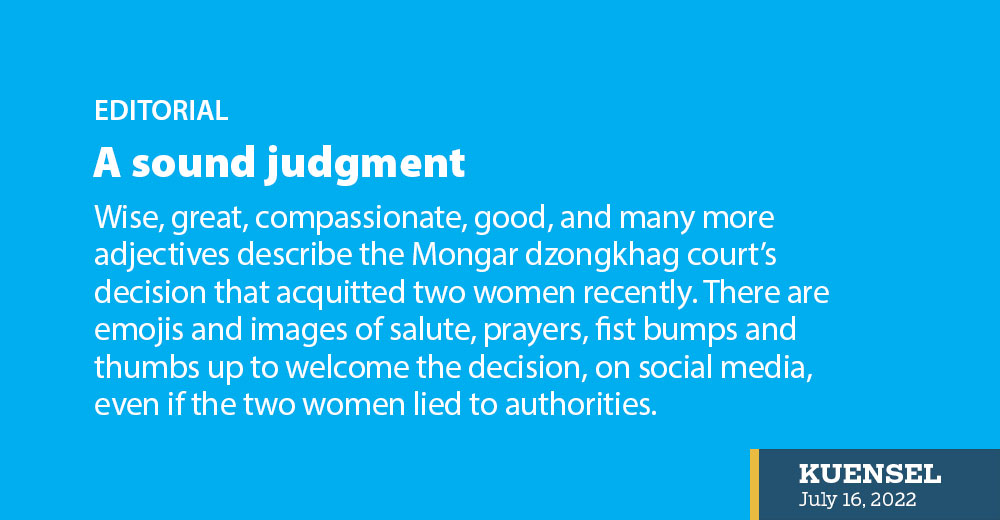Wise, great, compassionate, good, and many more adjectives describe the Mongar dzongkhag court’s decision that acquitted two women recently. There are emojis and images of salute, prayers, fist bumps and thumbs up to welcome the decision, on social media, even if the two women lied to authorities.
The court acquitted the two women on the grounds that they tried to protect a newborn and its mother. They may have provided false information to authorities, but in the eyes of the judge, all that happened was in good faith – for the welfare of the infant, to protect the baby and prevent greater harm.
The judgment that is welcomed and appreciated comes at a time when a lot is happening in the judiciary – most of them, for the wrong reasons. Amidst the recent case of an attempted stabbing at the Supreme Court premise and litigants complaining of unfair trial, the Mongar verdict comes as a relief. It will, like one said, help rebuild trust in our justice system.
Not many would wonder why two women lying about a newborn was acquitted, but our judges know that for any person to be convicted of a crime, there must be two very essential elements. In judicial terms they call the mental element- the intention to commit an unlawful act and the physical element – the unlawful act committed. The two women involved in an act, but without the intention to commit a crime. They wanted to save a newborn and a marriage!
The Mongar court decision, if appreciated, is encouraging and comes as an eye opener. Most judges go by what is spelled in the book of law. As a Buddhist country, where even our laws are derived from Buddhism, we have the leverage to interpret laws in our own context without jeopardizing justice.
This is not the first case. A few years ago, another court deviated from the conventional judgment system by resorting to corrective or reformative judicial processes. When two school children came into conflict with law, the judge resorted to correctional sentencing. The court asked two students to serve meals during the local tshechu for the crime they committed. The boys broke the windshield of a truck.
We can surmise the boys have learnt a lot of the local tshechu and community value because of the crime they committed. The crime taught them valuable lessons that their teachers would have never thought of imparting.
What the courts did was in line with the national policies of Gross National Happiness and Buddhist values if not with international best practices of criminal justice systems.
Most crimes are straightforward and cannot be looked at from the reformative or restorative perspective. But wherever and whenever we can, we should encourage that. A lot will depend on the judge presiding over the case.


